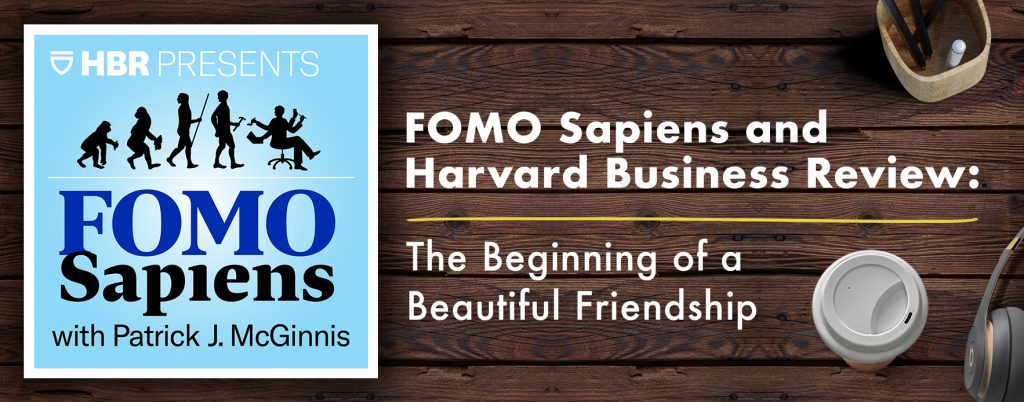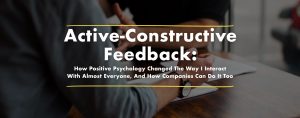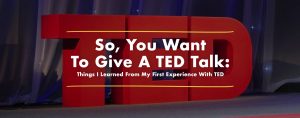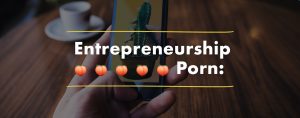Greetings, fellow FOMO Sapiens! By the time you read this, the FOMO Sapiens podcast you know and love will have partnered with Harvard Business Review Presents, a community of podcasts curated, sponsored, and produced by my alma mater. (You may have noticed some of my very favorites have made their way onto the 10% Podcast Club on Facebook and LinkedIn.) As the show moves into what I think will be the best season yet, I’m starting to realize that the evolution of my relationship to FOMO Sapiens has a lot of lessons for how to approach an entrepreneurial venture in general.
When I first launched FOMO Sapiens, I had no expectations- this is a trendy thing to say, but I really mean it: I literally started it just for fun and to see if I could do it. I was beginning the early work on the upcoming FOMO Sapiens book, I had a mess of friends and past associates that I knew would have interesting things to say about FOMO, FOBO, and entrepreneurship, and I saw it as a fun exercise to focus some of my thoughts and content for the book. And, okay, I had some FOMO because basically everyone on Earth has a podcast now. But basically, I wanted to try something new and learn- the 10% mindset.
As I’m fond of reminding people, the terms FOMO and FOBO came to life in a paper I wrote while I was at Harvard Business School. I’m surprised to report that, beyond the general zeitgeist around the FOs, they’re still very popular terms and topics at HBS. Not long ago, I even received a text from a student that dean of students Nitin Nohria “talked about you and FOMO three times today.”
As you can see, I have a lot of attachment to my school even years later, and that’s probably most reflected in how active I am in the alumni association. I regularly attend HBS alumni events, and it was at such an event that a friend, Irina Babushkina, SVP at Neuberger Berman, introduced me to the dean and said simply, “HBR is looking into podcasts. Try it out.” I pitched FOMO Sapiens in its then-current state, with season 1 under my belt, and was put in touch with Adi Ignatius, editor-in-chief at HBR, “the decider” when it comes to HBR’s growing repertoire of podcasts.
Adi asked me to write a memo pitching the show, and as I sat down to do so, I realized it was the first time I had really stopped and thought about what FOMO Sapiens as a podcast is really about, beyond me having some fun. Organizing the characteristics of my creation as a product to pitch made me think about it on a deeper level, and gave the project rigor- I wasn’t just screwing around, I was creating something a respected media outlet wanted more of.
HBR has already been an amazing partner, and my contact there, product manager Adam Buchholz, has been a wonderful guide thus far. There’s no question this partnership is going to net huge dividends for the show- better production values, better distribution, timely and efficient rollouts, and insights from some of the best minds from HBS on how to keep quality high.
I’ve got 3 takeaways from this experience:
- I found an appropriate partner- functionally and emotionally. I’m going back to where I came from, and that gives me a level of comfort and confidence in the partnership that normally can take weeks or months to cultivate. I’m not just being sentimental, though- HBR is vetted from my own network and research, so I know they’ve got the bones to do right by my project. Follow your head AND your heart when you pick a partner- partnerships run on both.
- This is all a product of a passion project. As I said, I started FOMO Sapiens with no expectations, doing it entirely for the love of it. I already had a main gig, and while monetization is certainly a potential outcome of a successful podcast, it wasn’t my first motivation- I had that covered. I’m (literally!) constantly surprised by what my random pursuits evolve into. Volunteer and do things you love- you’ll never know where they’ll lead.
- Be humble.I started FOMO Sapiens not knowing anything about podcasts, and embraced it- I was eager to learn everything about the process, from how to give better interviews, pacing an episode, the technical process of recording and editing, and beyond. Learning as much as I did- and it was a LOT- showed me how much more I had to learn, and showed me that partnering with HBR was such a good idea if I wanted to take FOMO to the next level. Be comfortable learning how to improve; embrace what you don’t know.
I hope you’ll stay with me as FOMO Sapiens continues its journey ever onward and upward, and that you’ll participate- the show continues to thrive because of the tremendous feedback and suggestions of its listeners.
See you soon!




